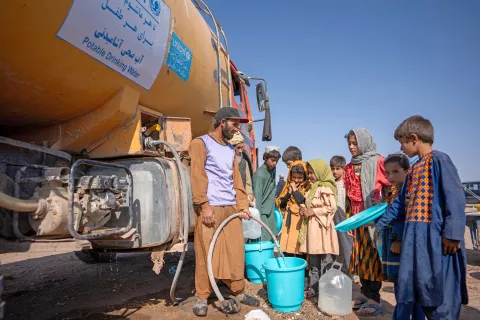How clean hands and healthy tummies lead to full attendance in class
Restoring the rights and dignity of students and teachers through new sanitation and water systems in Afghanistan


MAZAR-I-SHARIF, Afghanistan – Imagine, for a moment, going to school or a workplace that had no functioning toilets or running water.
Imagine how frustrating that would be. How inconvenient. How painful. How undignified.
During a visit to Mazar-i-Sharif, in the north of Afghanistan, in December 2021, UNICEF was alerted to the fact that the school, with a population of 9,000 students (3,500 girls and 5,500 boys), led by 190 teachers, in two morning and afternoon shifts, had neither functioning toilets nor running water.
In the last years, we lost our toilet facilities one by one until they were all shut down. Then our only source of water broke down. It was hard to come to school, especially for us girls. I feel relaxed about coming to school now because I can manage myself with dignity.

For adolescent girls who have to manage menstruation every month, the lack of water and sanitation facilities meant embarrassment, a worrying lack of hygiene and, as has been reported in many countries, a reason many girls don’t come to school or drop out altogether.
UNICEF Afghanistan’s regional field office in Mazar-i-Sharif responded to the official request from the Education Department for support. UNICEF rehabilitated the school's sanitation facilities with European Union Civil Protection and Humanitarian Aid (ECHO) funding.
Since May 2022, the high school has had a water source thanks to a brand-new borehole connected to a 20,000-litre overhead storage tank powered by a solar system. As a result, there are functioning toilets for girls and boys, including a 12-faucet handwashing point on the school grounds.
Before the borehole was drilled, the school community experienced a lot of waterborne diseases because we used to get unclean water from surrounding areas. Our clean water source has brought back health and dignity to our school. The girls and boys, including their teachers, are now guaranteed safe drinking water and fully functioning ablution facilities.


UNICEF knows that getting access to the right resources, like water, can make a positive difference in the lives of children and their families. Through our School WASH programme, we have contributed to restoring the rights and dignity of learners by providing safe drinking water for 11 high schools in the Mazar region (10 in Balkh and one in Faryab) using solar-powered water systems benefiting 21,520 learners.
To keep these efforts sustainable, UNICEF has delivered hygiene awareness sessions for students and teachers. In response, the school set up a committee among the teachers to promote personal and community hygiene among the students on periodical bases. Teachers and guards have been trained to operate and maintain the refurbished facilities.
Here’s to clean hands, healthy tummies, and full attendance in class.
###




